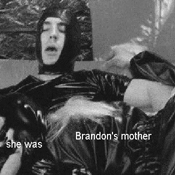 |
|
 |
 |
 |
 |
 |
  |
webwork 3
48 HOURS,
by Trevor Lodge
 48 Hours in American Life
48 Hours in American Life
Trevor Dodge's 48 Hours tells of the adversities in the life of American football fan Brandon: his name isn't manly enough for him; he won't have access to broadband, poor thing, until 13 years from now.
Gena, his girlfriend, had her breast reduced, and hates it that Brandon occasionally sleeps with Terry; his mother remembers where she was when Kennedy was shot; and Terry was raped by her father with a broomstick.
The stage is set.
Dan Rather hosts 48 Hours on TV and dominates its protagonists' horizon. His image sometimes becomes so insistent it invades the whole screen, then becomes the whole screen.
The American dream gets laid out with its usual icons: car ads, K-Mart supermarkets, ever-present TV, trivialized pornography - one could be in a Bret Easton Ellis novel.
However, the specificity of Dodge's work in Flash gives it a distance from this now well-known theme. While he offers a very recognizable sampling of Nightmare America, his formal work on text and image also shows how one may both laugh and cry about it. For instance, his text sometimes comes off as arty, like an animated concrete poem, other times it has the brashness of an ad campaign. At times finely wrought, at others quite banal. It suggests irony by the mere choice of typography and the order of the words' appearance on the screen - like the repeated inscription "a lot," which recurs like a refrain. And it scrolls by at such speed that one has to read it at a glance; like the images of music clips that hammer one's retina, it demands sustained attention if one is to understand anything of the story. Thus, it loses its first quality as text: permanence. Treated like an image, it becomes an image in turn, an image that one must be certain to capture to follow the narrative. And when we manage it, when we make out the skein of poor Brandon's destiny, we find out that under the appearance of his slightly off-beat and funny American life is an absurd collage whose nonsense makes sense. The images, borrowed from the universe of advertising, television, pornography and comic books, are all similarly displayed to make us understand their total and definite severance from their source. Thus, in the final sequence, as we learn that Brandon's mother knew her whereabouts when Kennedy died, the latter's image quickly appears in the middle of a porn scene. There are only images left, and these images have definitely forsaken their referent.
That, essentially, is what Trevor Dodge's work has to say.
Whether we believe ourselves to be following the trivial story of an ordinary American, or the social critique of that story, we realize in the end that it is a red herring. We are only following the destructive interplay of some icons, commonplaces so common they become placeless.
And we don't know whether to laugh or to cry.
Xavier Malbreil

 top top
 back back
|
|
 |
 |
 |
|

